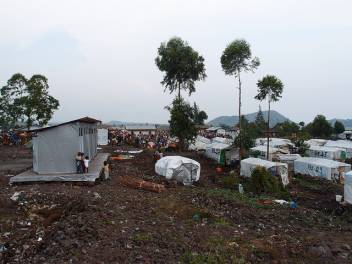 Do you remember the last time you went camping? You probably recall these typical scenarios: Rain, wearing lots of layers because of the cold, being soaked because your waterproof jacket is letting the rain in, feeling the stones and uneven ground sticking through your camping mat into your back, trying to navigate your way to the toilet block with a torch while avoiding tripping on other tent pegs…
Do you remember the last time you went camping? You probably recall these typical scenarios: Rain, wearing lots of layers because of the cold, being soaked because your waterproof jacket is letting the rain in, feeling the stones and uneven ground sticking through your camping mat into your back, trying to navigate your way to the toilet block with a torch while avoiding tripping on other tent pegs…
Then imagine that you live in these kinds of conditions, but ten times worse, every single day. It becomes your home, your daily life and you can’t escape it. You can’t take a hot shower or escape the torrential rain and your tent is battered by the elements and collapses. You have nothing to eat and nothing to sleep on, rocks and stones on the ground hurt your entire body.
Then imagine you are an 80-year-old man or woman living in a camp site for internally displaced people (IDP), along with thousands of others, in the world’s poorest and least developed country.
Hundreds of thousands have fled
The recent escalation of the conflict in the eastern Democratic Republic of Congo (DRC) has forced hundreds of thousands of people to flee their homes and find shelter in camps like these in and around the city of Goma in North Kivu province. They bring with them whatever they can carry and set up their tents on terrain which can best be described as uninhabitable. It is basically rocks, stones and old lava, the result of volcanic activity from Nyragongo volcano. It looks like a construction site.
For older people in North Kivu who have fled the conflict and constant threat of violence, one would hope that they would find safety and refuge when they arrived at an IDP camp.
Unfortunately, this is not always the case.
Living in the camps
IDP camps don’t always provide the adequate protection to keep residents from harm and instead of being “safe spaces” for humanitarian assistance, can be targets for looting, rape, theft and physical abuse.
It’s difficult to see the benefits when thousands of people are struggling to survive and men, women, old and young share the same sleeping mat under a couple of pieces of plastic sheeting held together with sticks and rope. Water is scarce, toilets are blocked and overflowing and people complain of hunger, despite the World Food Programme declaring it has already completed its ration distributions.
So how do people cope on a daily basis in these conditions, knowing that they cannot return home because the threat of violence remains?
Older people’s associations
HelpAge International in DRC has been active in establishing an older people’s association to support older people who arrive at the IDP camp of Mugunga III on the outskirts of Goma.
This camp has received approximately 3,786 older people fleeing their homes from the territory of Rutshuru in Norh Kivu. This association, led by a committee, was quick to mobilise its members and community health agents when the first wave of older people began to arrive.
Not only did they register older people who arrived, they also helped them to set up their make-shift tents and referred those who needed medical assistance to the health clinic. They are also ensuring that the camp managers and UN agencies providing food and other items are aware of the older refugees and include them.
Support network for older displaced people
The older people’s association has been the advocate and support network for the newly (and old) displaced. Supported by a HelpAge team who work in livelihoods, health and protection, the older people’s association has played and continues to play an important role in ensuring that older people are considered, included and that their voices are heard in every stage of humanitarian assistance.
Without the older people association in place, older people would be even more vulnerable and isolated. It is a model that works.
Read more about the current crisis in DRC and our work there to support older people and their families.
